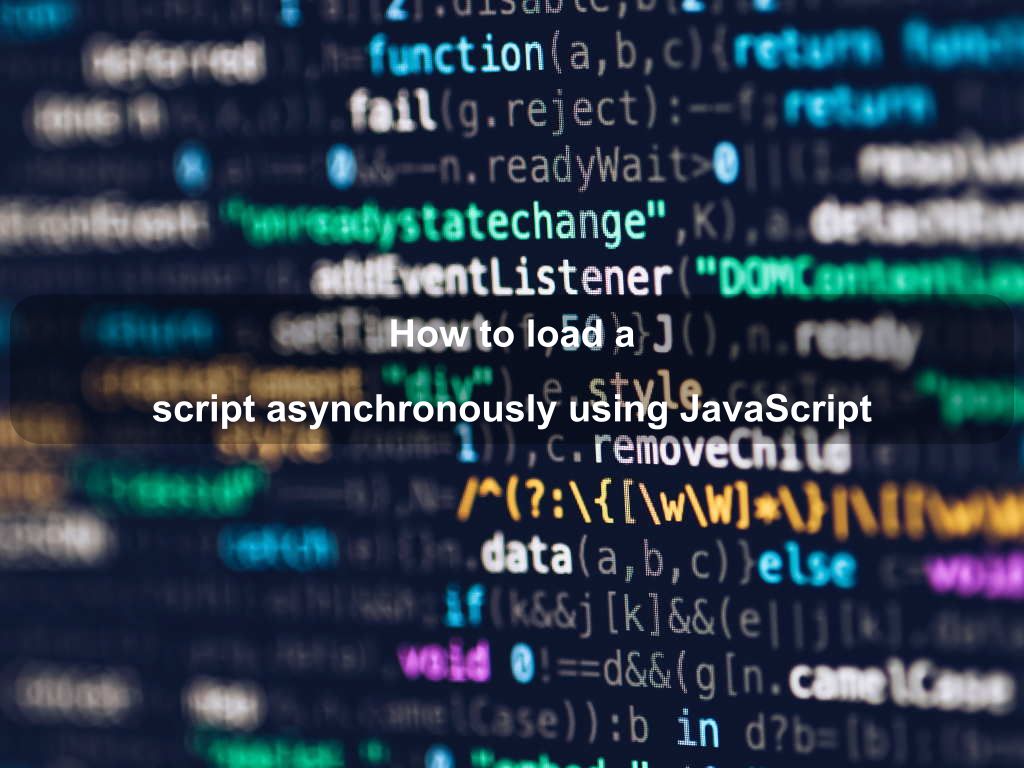published: 06 Jul 2022
2 min read
How to load a script asynchronously using JavaScript
In the modern web, it is common to use 3rd-party libraries like Google Analytics, Facebook Login, etc., to integrate with those services.
In this article, you'll learn how to load an external script file asynchronously in the browser using JavaScript.
The idea is to create a function that takes the script URL as a parameter and loads it asynchronously using a promise.
The promise will be resolved successfully when the script is loaded. Otherwise, rejected.
const loadScript = (src, async = true, type = 'text/javascript') => {
return new Promise((resolve, reject) => {
try {
const el = document.createElement('script')
const container = document.head || document.body
el.type = type
el.async = async
el.src = src
el.addEventListener('load', () => {
resolve({ status: true })
})
el.addEventListener('error', () => {
reject({
status: false,
message: 'Failed to load the script ${src}'
})
})
container.appendChild(el)
} catch (err) {
reject(err)
}
})
}
Let's try to load Facebook JavaScript SDK:
loadScript('https://connect.facebook.net/en_US/sdk.js')
.then(data => {
console.log('Facebook script loaded successfully', data)
})
.catch(err => {
console.error(err)
})
That's it! You can also perform actions inside the promise once it is resolved successfully. This trick can also be used to conditionally load scripts for different environments.

Are we missing something? Help us improve this article. Reach out to us.
How to load a script asynchronously using JavaScript
In the modern web, it is common to use 3rd-party libraries like Google Analytics, Facebook Login, etc., to integrate with those services.
In this article, you'll learn how to load an external script file asynchronously in the browser using JavaScript.
The idea is to create a function that takes the script URL as a parameter and loads it asynchronously using a promise.
The promise will be resolved successfully when the script is loaded. Otherwise, rejected.
const loadScript = (src, async = true, type = 'text/javascript') => {
return new Promise((resolve, reject) => {
try {
const el = document.createElement('script')
const container = document.head || document.body
el.type = type
el.async = async
el.src = src
el.addEventListener('load', () => {
resolve({ status: true })
})
el.addEventListener('error', () => {
reject({
status: false,
message: 'Failed to load the script ${src}'
})
})
container.appendChild(el)
} catch (err) {
reject(err)
}
})
}
Let's try to load Facebook JavaScript SDK:
loadScript('https://connect.facebook.net/en_US/sdk.js')
.then(data => {
console.log('Facebook script loaded successfully', data)
})
.catch(err => {
console.error(err)
})
That's it! You can also perform actions inside the promise once it is resolved successfully. This trick can also be used to conditionally load scripts for different environments.
Are you looking for other code tips?
JS Nooby
Javascript connoisseur





